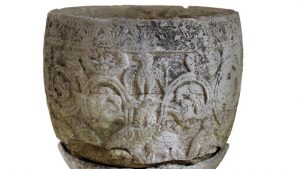
Sometimes you read about a decision by a local Counsel and you want to see the person who made it and ask why. Colchester Council has destroyed a 2000 year old Roman garden fountain because it couldn’t find a suitable home for it. It was discovered in 1998 and has been described as a unique piece of garden furniture (The Times, 10/09/18). The Counsel said that it had been damaged on excavation and that it was too costly to repair but I suppose you could say that about most things that had been buried for 2000 years and then dug up. The Council went on to say, “We have to strike a balance with the level of public funding and storage space available unfortunately, on very rare occasions, exceptionally difficult decisions have to be made.” I would like to ask this Counsel officer how often these difficult decisions are made, by whom and with whose approval. The other question is how hard did he try. Most counsels have more spaces than they can account for where this artifact could have been displayed including, libraries, offices, schools, theaters and Universities. If these are all ‘choc a block’ with Roman remains, what about giving to other counsels who are not so Roman artifact rich. Perhaps, given the garden connection, somewhere like Kew Gardens might be interested. What I suspect is that this was a low level decision, taken routinely in an area where Roman archaeology is common and under valued. There should be a higher level of accountability when these ‘exceptional decisions’ are made and should involve independent archaeological oversight.
It seems that the biggest threat to the survival of Roman history in Britain is not the Saxons, Angles and Scots but local Councils like Colchester.
reference: The Times, 10/09/18, Quotation by Axel Oxenstierna “An nescis, mi fili, quantilla prudentia mundus regatur?” = Do you not know, my son, with how little wisdom the world is governed?https://en.wikipedia.org/wiki/Axel_Oxenstiernahttps://en.wikipedia.org/wiki/List_of_Latin_phrases_(full)
